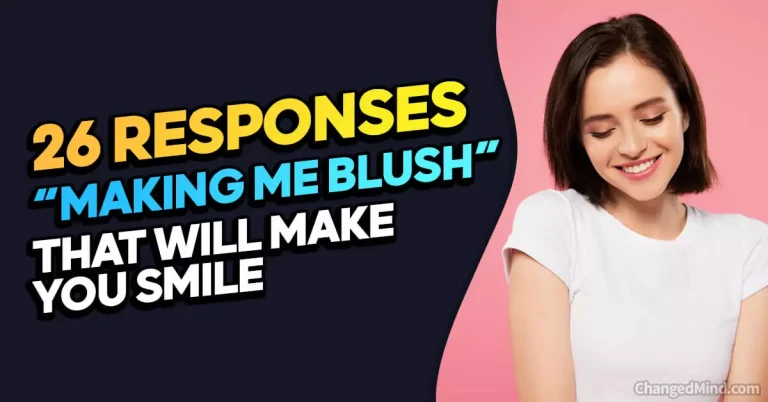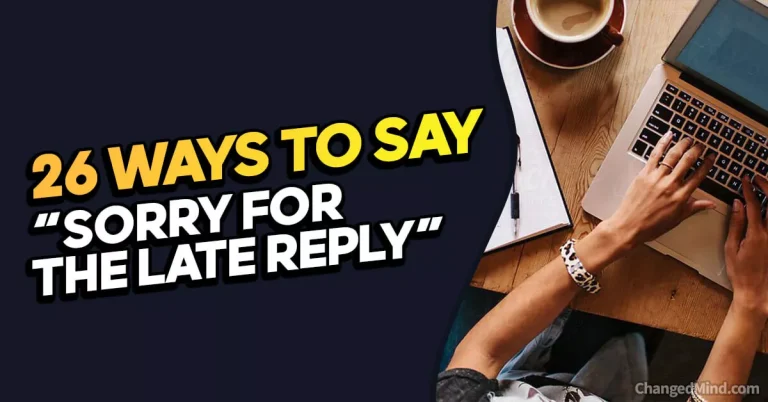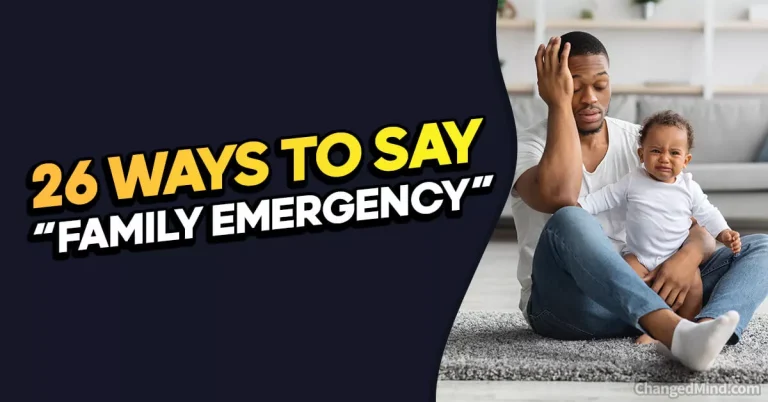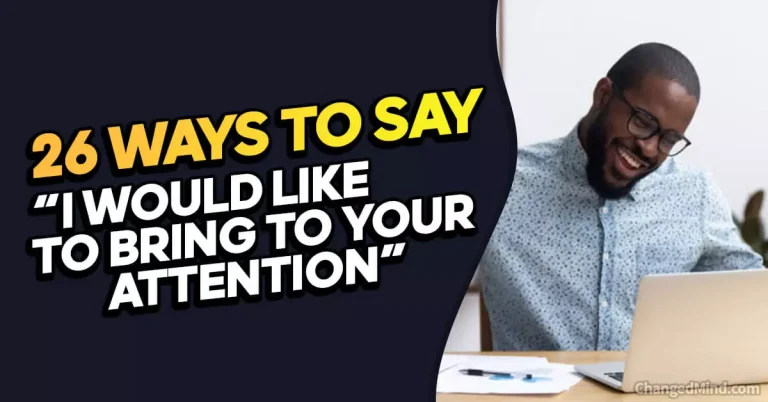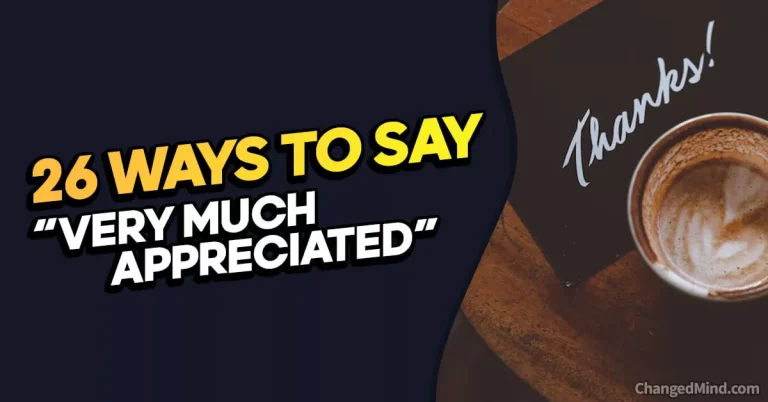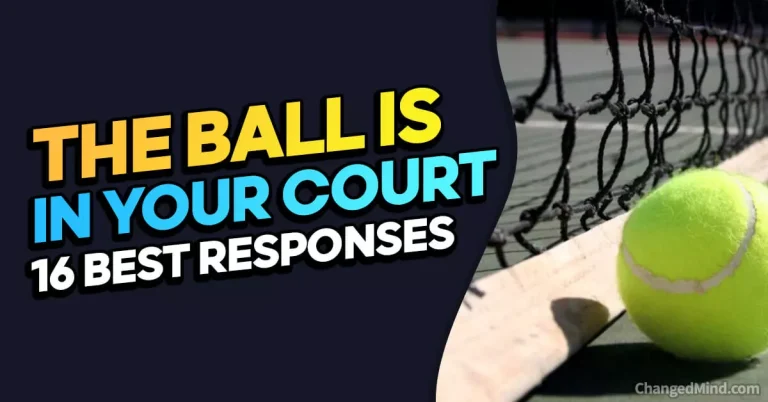Picture this: You’re in the midst of a conversation, and someone shares their thoughts or feelings with you.
Suddenly, you find yourself thinking, “I’m sorry you feel that way,” but wait—there’s a whole world of empathy and understanding just waiting to be explored!
In this article, “26 Other Ways to Say ‘I’m Sorry You Feel That Way’,” we’re on a mission to turn those moments of empathy into expressions that truly resonate. 😄💬
The short answer? We’ve curated a list of 26 creative and heartfelt alternatives that will not only make your apologies more meaningful but also enhance your connections with others.
Why keep reading? Because you’re about to become a master of empathy, and your responses are about to sparkle with warmth and sincerity.
Ready to dive into the world of alternative expressions?
Let’s embark on this journey together! 🚀 #OtherWaysToSayImSorryYouFeelThatWay
Key Points:
- Add depth to your expressions of empathy.
- Make your apologies more heartfelt.
- Enhance your connections with others.
- Stand out with sincere alternatives.
When it comes to expressing empathy and acknowledging someone’s feelings, saying “I’m sorry you feel that way” is a common phrase that is often used.
However, it is important to recognize that this statement can come across as dismissive or insincere to some people.
Understanding the implications of this phrase and exploring alternative ways to convey empathy is crucial in effective communication.
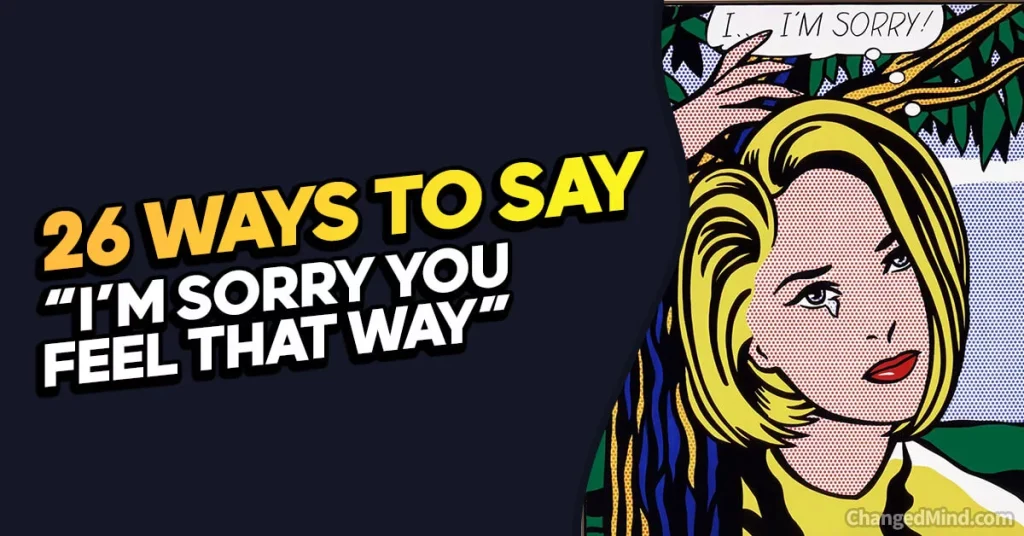
But what does “I’m sorry you feel that way” really mean? It is a statement that acknowledges the other person’s emotions without necessarily taking responsibility or expressing remorse for causing those feelings.
It is a way of recognizing their perspective without fully engaging in the situation.
The reason behind the frequent usage of “I’m sorry you feel that way” is because it allows the speaker to express sympathy without accepting any fault or blame.
It can be used as a way to avoid confrontation or to maintain a sense of distance in difficult conversations.
However, there are alternative phrases that can be used to express empathy and understanding more effectively.
These phrases help validate the other person’s feelings while also maintaining a sense of connection and concern.
Some alternative phrases to consider include:
- “I hear you.“
- “I understand.“
- “I can see how you might feel that way.“
- “That must be difficult.“
- “I didn’t mean to upset you.“
Using these alternative phrases is appropriate in situations where empathy is needed, when you want to validate someone’s feelings, and when you want to maintain a positive relationship with the other person.
By exploring these alternatives, you can enhance your communication skills and ensure that your empathy is conveyed in a more genuine and meaningful way.
Key takeaway:
- “I’m Sorry You Feel That Way” is a phrase used to acknowledge someone’s emotions, but it can be ineffective in resolving conflict.
- Alternative phrases like “I Hear You,” “I Understand,” and “I Can See How You Might Feel That Way” show empathy and validate the other person’s feelings.
- Using alternative phrases is important when empathy is needed, when you want to validate someone’s emotions, and when you want to maintain the relationship.
26 Other Ways to Say “I’m Sorry You Feel That Way”
Here are 26 other ways to express “I’m Sorry You Feel That Way” with empathy and understanding:
- I understand your perspective.
- Your feelings are valid.
- I appreciate your point of view.
- Your emotions matter.
- I hear what you’re saying.
- I acknowledge your feelings.
- Your thoughts are important.
- I respect your viewpoint.
- Your sentiments are valued.
- I see where you’re coming from.
- Your perspective is valid.
- I empathize with your feelings.
- Your emotions are understandable.
- I recognize your standpoint.
- Your thoughts are heard.
- I value your feelings.
- Your viewpoint matters.
- I sympathize with your perspective.
- Your sentiments are respected.
- I’m here to listen.
- Your emotions are acknowledged.
- I support your point of view.
- Your feelings are important to me.
- I’m here for you.
- Your perspective is appreciated.
- I’m with you on this.
These alternatives will help you convey empathy and understanding in a variety of situations with sincerity and compassion.
26 Polite Ways to Say “I’m Sorry You Feel That Way”
Here are 26 polite ways to express empathy and understanding when someone shares their feelings, even if you may not agree or have a different perspective:
- I’m sorry to hear you’re feeling that way.
- I can see that this has been difficult for you.
- Your feelings are valid, and I’m here to listen.
- I understand that you’re going through a tough time.
- It’s clear that this situation has affected you deeply.
- Please know that I respect your point of view.
- I acknowledge your emotions in this matter.
- I appreciate you sharing your perspective with me.
- I’m here to support you during this time.
- Your feelings matter, and I’m here to listen.
- I’m sorry if my actions contributed to your feelings.
- Your viewpoint is important to me, and I hear you.
- I understand that you have strong feelings about this.
- I’m here to lend an empathetic ear.
- Please accept my sympathy for what you’re going through.
- Your emotions are important, and I want to understand.
- I value your honesty in expressing your feelings.
- I’m here to provide support in any way I can.
- I’m genuinely sorry to learn of your feelings.
- Please know that I care about your well-being.
- I’m here to learn from your perspective.
- I’m here to help in any way that I can.
- Your feelings are heard and respected.
- I appreciate your openness in sharing your emotions.
- I’m here to offer my support during this challenging time.
- I’m sorry that you’re going through this, and I’m here for you.
These phrases demonstrate empathy, respect, and a willingness to listen and support the person, even if you may not share their feelings or viewpoint.
What Does “I’m Sorry You Feel That Way” Mean?
“I’m Sorry You Feel That Way” is a phrase often used to acknowledge someone’s emotions without actually taking responsibility for their feelings or actions.
It is a way of expressing sympathy for how the other person feels, without necessarily apologizing for the situation or taking any blame.
This phrase, “I’m sorry you feel that way,” is commonly used in situations where the speaker wants to acknowledge the other person’s emotions without admitting fault or expressing personal remorse.
When someone says “I’m sorry you feel that way,” it can be interpreted in different ways depending on the context and tone of the conversation. It can be seen as dismissive or insincere if it is said without genuine empathy or understanding.
In some cases, it might be a way for the speaker to show that they care about the other person’s emotions, even if they don’t agree with their perspective.
It is important to note that saying “I’m sorry you feel that way” does not necessarily mean that the speaker agrees with the other person or that they think they are wrong.
It is simply a way of acknowledging their feelings and showing empathy without taking personal responsibility for the situation.
A pro-tip for using this phrase effectively is to be mindful of the tone and context in which it is used. It is important to make sure that the other person feels heard and understood, rather than dismissed or invalidated.
Using active listening skills and offering support can help to enhance the effectiveness of this phrase and improve communication in difficult situations.
Overall, “I’m sorry you feel that way” is a phrase that acknowledges someone’s emotions without taking personal responsibility for the situation.
It is important to use it with empathy and understanding, and to ensure that the other person feels validated in their feelings.
By doing so, it can lead to better communication and resolution in challenging situations.
Why Is “I’m Sorry You Feel That Way” Often Used?
“I’m Sorry You Feel That Way” is often used because it allows the speaker to acknowledge the other person’s emotions without taking responsibility or admitting fault.
This phrase is commonly used in situations where the speaker wants to avoid conflict or argument.
Here are some reasons why “I’m Sorry You Feel That Way” is often used:
1. To maintain a sense of control:
By using this phrase, the speaker maintains a sense of control over the situation and avoids accepting blame or responsibility. This can help the speaker avoid confrontation and keep the conversation more peaceful.
2. To show empathy:
While the phrase may not explicitly convey empathy, it does acknowledge the other person’s emotions. It lets them know that their feelings are acknowledged, even if the speaker doesn’t agree with them or take responsibility for causing them.
3. To avoid admitting fault:
Using “I’m Sorry You Feel That Way” allows the speaker to avoid admitting fault or taking responsibility for their actions. This can be helpful in situations where they don’t believe they have done anything wrong or don’t want to apologize.
4. To de-escalate tension:
When tensions are high and emotions are strong, using this phrase can help de-escalate the situation. It avoids escalating the conflict further by refusing to engage in an argument or accepting blame. Instead, it focuses on the other person’s emotions and attempts to diffuse the situation.
5. To maintain harmony in relationships:
Using “I’m Sorry You Feel That Way” can help maintain harmony in relationships by avoiding unnecessary conflicts or arguments. It allows the speaker to acknowledge the other person’s feelings without necessarily agreeing with them, helping to preserve the relationship.
While “I’m Sorry You Feel That Way” can be a useful phrase in certain situations, it is important to consider the impact it may have on the other person. It is essential to communicate effectively and genuinely address the issues at hand to promote understanding and resolution in relationships.
Alternative Phrases to “I’m Sorry You Feel That Way”
Looking for alternative phrases to “I’m sorry you feel that way”? Let’s explore some creative ways to express empathy and understanding. From “I hear you” to “That must be difficult,” we’ll discover phrases that acknowledge and validate another person’s emotions without resorting to a generic apology. So, if you’re seeking more genuine and effective ways to address someone’s feelings, keep reading for a range of insightful alternatives. No more settling for the same old apologies – let’s find better, more meaningful ways to connect.
1. I Hear You
When someone expresses their feelings or concerns to you, it is crucial to respond in a supportive and understanding manner. One phrase that effectively conveys empathy is “I hear you.” This simple expression not only acknowledges the person’s emotions but also demonstrates active listening to their perspective.
By saying “I hear you,” you communicate that you are fully engaged and attentive in the conversation. This conveys that you respect their thoughts and emotions, even if you may not necessarily share the same viewpoint. The phrase creates a safe and open space for honest communication, nurturing trust and understanding between both parties.
Using “I hear you” also signals that you are not dismissing or minimizing their feelings. It shows your willingness to validate their emotions and offer support. This phrase proves particularly valuable when individuals feel unheard or invalidated.
For instance, if someone expresses frustration about a challenging work situation, you can respond with, “I hear you. It seems like you’re encountering numerous obstacles in the office.” This response acknowledges their concerns and conveys active listening and understanding of their perspective.
Pro-tip: Remember that using “I hear you” is just the initial step in effective communication. To further enhance the conversation, you can follow up with open-ended questions or additional empathetic responses to deepen your understanding of their feelings and experiences.
2. I Understand
When someone expresses their feelings or emotions to you, it is crucial to demonstrate understanding and empathy. Here are some steps to effectively convey the message “I understand“:
- Listen actively: Pay full attention to the person speaking to you, maintaining eye contact and avoiding distractions.
- Acknowledge their feelings: Use phrases like “I see that you’re feeling [emotion]” or “It sounds like you’re experiencing [emotion].” This demonstrates that I understand their emotional state.
- Reflect their feelings: Use empathy statements to show understanding, such as “I can imagine that it must be [emotion] for you” or “It must be [emotion] to go through [situation].” This indicates that I am able to put myself in their shoes and understand their emotions.
- Show compassion: Express sympathy towards their situation and validate their feelings. For instance, I could say “I can understand why you would feel [emotion] given the circumstances.”
- Offer support: Let them know that I am there for them and willing to help in any way possible. I can say “Is there anything I can do to support you?” or “I’m here to listen if you need to talk.”
Pro-tip: It’s essential to truly listen and avoid interrupting or dismissing their feelings. Remember that understanding doesn’t mean agreeing, but rather acknowledging and empathizing with their emotions.
3. I Can See How You Might Feel That Way
When someone expresses a certain feeling or perspective, it is important to acknowledge and validate their emotions. One phrase that can be used to show understanding is “I can see how you might feel that way.” This statement demonstrates empathy and recognizes the individual’s right to their own emotions. Instead of dismissing or arguing against their feelings, this phrase allows for open communication and fosters a sense of understanding.
Using the phrase “I can see how you might feel that way” is an active way to engage in the conversation and show respect for the other person’s point of view. By acknowledging their feelings, you can create a safe space for open dialogue and find common ground. It is important to remember that everyone’s experiences and perspectives are valid, and by using this phrase, you can enhance mutual understanding and build stronger relationships.
In situations where empathy is needed, such as during conflicts or disagreements, using this phrase can defuse tension and help to find a resolution. It allows both parties to express themselves and feel heard without judgment or criticism. By affirming that you understand their perspective, you can cultivate trust and create a more positive and harmonious environment.
Using the phrase “I can see how you might feel that way” is effective when you want to validate someone’s feelings. It shows that you acknowledge their emotions and do not dismiss or belittle them. This can help to boost their self-esteem and promote healthy communication.
Using the phrase “I can see how you might feel that way” is a powerful tool for effective communication. It demonstrates empathy, understanding, and validation of the other person’s feelings. By employing this phrase, you can enhance relationships, resolve conflicts, and foster a positive and supportive environment.
4. That Must Be Difficult
When someone shares their feelings with you, it is important to acknowledge and validate their emotions. One way to do this is by saying, “That must be difficult.” This phrase shows empathy and understanding towards the person’s situation. Here are some steps to follow when using this alternative phrase:
- Listen actively: Pay attention to what the person is saying and demonstrate that you are fully engaged in the conversation.
- Reflect on their words: Take a moment to internalize their feelings and try to put yourself in their shoes.
- Express empathy: Respond by saying, “That must be difficult.” This statement conveys your understanding of their situation and shows that you acknowledge the challenges they are facing.
- Avoid minimizing their feelings: It is important not to downplay or dismiss their emotions. Instead, validate their experience by acknowledging the difficulty they are going through.
- Offer support: Let the person know that you are there for them and willing to provide assistance or a listening ear if they need it.
Using the phrase “That must be difficult” shows compassion and validates the emotions of the other person. It allows them to feel heard and understood, which can strengthen the bond between you. By employing active listening and expressing empathy, you can navigate difficult conversations with grace and sensitivity.
In a similar tone, here is a true story that exemplifies the importance of acknowledging difficulty:
A few years ago, my friend Sarah lost her job unexpectedly. She felt devastated and unsure of what the future held for her. I listened attentively as she shared her feelings of frustration, fear, and uncertainty. After she finished speaking, I took a moment to empathize with her situation and said, “Sarah, that must be difficult.” She immediately teared up and expressed gratitude for my understanding. It became apparent to me that by acknowledging the challenges she was facing, I was able to provide her with the support she needed. From that day forward, our friendship grew stronger, and we became pillars of support for each other during difficult times.
5. I Didn’t Mean to Upset You
When saying “I didn’t mean to upset you,” you are acknowledging that your words or actions have caused someone distress, but you did not have the intention of doing so. Here are some reasons why this phrase is commonly used and alternative phrases that can convey a similar sentiment:
- I didn’t mean to upset you: This phrase shows that you did not intend to cause any harm or hurt feelings.
- I didn’t intend to offend you: By using this phrase, you are expressing that your words or actions were not meant to be insulting or hurtful.
- My apologies for any distress I may have caused: This statement shows that you are taking responsibility for the impact of your words or actions, even if it was unintentional.
- I didn’t realize that would upset you: This phrase conveys surprise and remorse at the unintended consequence of your words or actions.
- I’m sorry if I crossed a line: By using this phrase, you acknowledge that you may have gone beyond what is acceptable or appropriate without intending to do so.
When to use the alternative phrases:
- When empathy is needed: Use these alternatives when you want to express understanding and compassion towards the other person’s feelings.
- When you want to validate their feelings: These alternative phrases help to acknowledge and validate the person’s emotions, showing that you understand their perspective.
- When you want to maintain the relationship: By expressing that you didn’t mean to upset the person, you are conveying a desire to preserve the connection and resolve any misunderstandings.
Remember, using phrases that convey your genuine intent and remorse can help in resolving conflicts and maintaining healthy relationships.
When to Use the Alternative Phrases?
Knowing when to use alternative phrases in place of “I’m sorry you feel that way” can greatly improve your communication skills. In this section, we’ll uncover the situations where these alternative phrases come into play. Whether it’s expressing empathy, validating someone’s feelings, or maintaining a healthy relationship, each sub-section offers valuable insights on how to navigate various interpersonal scenarios. So let’s dive in and discover the appropriate moments to deploy these alternative phrases for more effective and compassionate communication.
1. When Empathy is Needed
When empathy is needed in a conversation, it is crucial to genuinely understand and connect with the emotions being expressed by the other person. Empathy allows us to show compassion and support, and it plays a vital role in building strong relationships. In such situations, alternative phrases such as
“I hear you” can be used to acknowledge that you are actively listening to the other person’s thoughts and feelings. This phrase shows that you value their perspective and are willing to engage in a meaningful conversation. Additionally, the statement
“I understand” conveys that you grasp the emotions and experiences of the other person, assuring them that they are not alone in their feelings and that you can relate on some level. Furthermore, by validating their emotions and saying
“I can see how you might feel that way,” you demonstrate that you appreciate their point of view, even if it differs from your own, fostering an environment of understanding and open communication. Moreover, using the expression
“That must be difficult” acknowledges the challenges and hardships that the other person is facing, showing empathy by recognizing the impact their feelings have on their well-being. Additionally, while not directly expressing empathy, saying
“I didn’t mean to upset you” shows accountability and a willingness to take responsibility for unintentionally causing distress. This phrase can help diffuse tense situations and open the door for further discussion. Incorporating these alternative phrases helps to create a supportive and compassionate atmosphere during interactions, indicating that you value the other person’s feelings and are committed to fostering understanding and connection.
Fact: Research has shown that empathy not only benefits the individual receiving it but also has positive effects on the empathetic person’s own mental and emotional well-being. It can reduce anxiety and stress, improve relationships, and cultivate a sense of fulfillment and purpose.
2. When You Want to Validate Their Feelings
To validate someone’s feelings, it means to acknowledge and affirm the emotions they are experiencing. When you want to validate their feelings, there are alternative phrases you can use. Here are some:
- “I hear you”: This phrase conveys active listening and genuine understanding of their feelings.
- “I understand”: By saying this, you let the person know that you comprehend their emotions and can relate to their experience.
- “I can see how you might feel that way”: This phrase acknowledges that everyone has their unique perspective and that their feelings are valid based on their individual circumstances.
- “That must be difficult”: By recognizing the challenges the person is facing, you validate their feelings and show empathy towards their situation.
- “I didn’t mean to upset you”: This phrase indicates that you recognize the impact your actions may have had on their emotions and shows that you value their feelings.
You should consider using these alternative phrases when:
- Empathy is needed: Validating someone’s feelings is crucial when they are going through a difficult time or experiencing strong emotions. It helps them feel understood and supported.
- You want to validate their feelings: When someone expresses their emotions to you, using these alternative phrases can demonstrate that you respect and validate their feelings, making them feel heard and valued.
- You want to maintain the relationship: Validating someone’s feelings can strengthen the bond between you and the person you’re communicating with. It shows that you care about their well-being and are invested in the relationship.
By using these alternative phrases, you can effectively validate someone’s feelings and create a supportive and empathetic environment. Remember, everyone’s emotions are valid, and by acknowledging this, you can foster stronger connections with others.
3. When You Want to Maintain the Relationship
When you want to maintain the relationship, there are alternative phrases you can use instead of saying “I’m sorry you feel that way.” These phrases can help demonstrate empathy, understanding, and support, while also showing that you value the relationship with the other person.
I hear you: This phrase acknowledges that you are actively listening to the other person and paying attention to their feelings. It shows that you are interested in understanding their perspective.
I understand: By saying “I understand,” you are indicating that you comprehend the emotions and thoughts the person is experiencing. It conveys that you can relate to their situation.
I can see how you might feel that way: This statement recognizes that there are valid reasons for the other person’s feelings. It shows that you are open to considering their perspective and seeing things from their point of view.
That must be difficult: By acknowledging the difficulty the other person is facing, you are expressing sympathy and compassion. This phrase shows that you recognize their struggles and challenges.
I didn’t mean to upset you: This phrase accepts responsibility for any unintentional harm or offense caused. It demonstrates that your intentions were never to hurt the other person and assures them that you value the relationship.
When you want to maintain the relationship, it’s important to use these alternative phrases in appropriate situations.
Here are some instances when using them can be beneficial:
When empathy is needed: If the other person is going through a tough time or experiencing emotional distress, expressing empathy can help strengthen the relationship.
It shows that you care about their well-being and are there to support them.
When you want to validate their feelings: Validating someone’s feelings means acknowledging and accepting their emotions as legitimate. Using these alternative phrases communicates that you understand and respect their emotions, even if you may not agree with them.
When you want to maintain trust and connection: Relationships thrive on trust and a sense of connection. By using these alternative phrases, you show the other person that you value the relationship and are committed to working through any disagreements or misunderstandings.
Pro-tip: Remember that maintaining a relationship involves active communication, empathy, and understanding. By choosing your words carefully and using alternative phrases, you can create a positive and supportive environment that fosters healthy relationships.
Some Facts About Other Ways to Say “I’m Sorry You Feel That Way”:
- ✅ The phrase “I’m sorry you feel that way” is considered a half-apology and is not genuine. (Source: Our Team)
- ✅ Alternative phrases like “I’m really sorry that we can’t see eye to eye” and “It’s a shame we don’t understand each other” can be used to apologize instead. (Source: Our Team)
- ✅ “I’m sorry for making you feel that way” is the preferred alternative as it acknowledges the other person’s emotions and accepts responsibility for causing harm. (Source: Grammar How)
- ✅ The phrase “I’m sorry you feel that way” is often used as a non-apology apology in toxic relationships or situations of gaslighting. (Source: Refinery29)
- ✅ It is important to apologize for one’s actions, behaviors, or words, rather than apologizing for someone else’s feelings. (Source: Psychology Today)
Frequently Asked Questions
What is the problem with using the phrase “I’m sorry you feel that way” as an apology?
The phrase “I’m sorry you feel that way” is considered a non-apology apology because it fails to acknowledge responsibility for one’s actions. It apologizes for the person’s feelings rather than addressing the harm caused.
Why is “I’m sorry for making you feel that way” a preferred alternative to “I’m sorry you feel that way”?
“I’m sorry for making you feel that way” is a more genuine and meaningful apology because it acknowledges the other person’s emotions and accepts responsibility for causing harm. It shows accountability for one’s actions.
What are some other alternatives to the phrase “I’m sorry you feel that way”?
Some alternative phrases include “I’m sorry for what I did,” which takes responsibility for a specific action, and “I’m sorry for the things I said,” which apologizes for offensive or hurtful words. Other options include “I’m sorry for upsetting you” and “I’m really sorry.”
How can the phrase “I’m sorry for making you feel that way” be used in different situations?
“I’m sorry for making you feel that way” can be used in various contexts, such as professional or personal settings. It is recommended for professional situations and shows a willingness to drop an argument. It can also be used in close relationships to acknowledge and apologize for causing emotional distress.
Why is it important to avoid using “I’m sorry you feel that way” in most situations?
“I’m sorry you feel that way” is not considered a proper apology because it diminishes the sincerity of the apology. It fails to take responsibility for one’s actions and can come across as insincere or dismissive of the other person’s emotions.
How should an effective apology be framed to address the problem with “I’m sorry you feel that way”?
An effective apology should focus on taking responsibility for one’s actions, behaviors, or words. It should not apologize for the other person’s feelings. By acknowledging the harm caused and expressing sincere remorse, a true apology can help repair relationships and foster understanding.

